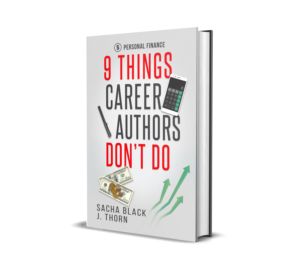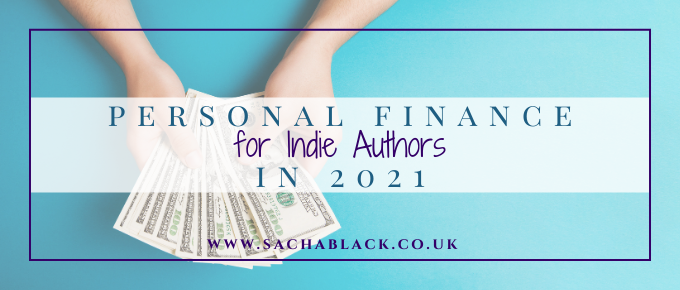Below is an excerpt from 9 Things Career Authors Don’t Do: Personal Finance. A book I cowrote with J. Thorn and released in late-2020. If you’re looking to go full-time as a writer in 2021, then this book will help you switch into the right financial mindset for success. Here’s a little look at personal finance for indie authors.
 There are two types of lessons in life: the ones we learn growing up: manners really do go a long way, don’t eat yellow snow—it won’t taste good and will probably give you a belly ache—and 1 + 1 =2.
There are two types of lessons in life: the ones we learn growing up: manners really do go a long way, don’t eat yellow snow—it won’t taste good and will probably give you a belly ache—and 1 + 1 =2.
And the other ones—the plethora of other lessons that our parents and loved ones try to pass on, but our inner rebels refuse to play student.
Things like, you don’t have to wear shin pads to play hockey—but if you don’t and you get hit, you’re gonna know about it. Or that, yes, your twenty-one-year-old self can drink a liter of Southern Comfort in one evening, but you can be assured that you’ll puke for a week and will probably need to see a doctor—was it just me who learned that one?
Moving on… These “other” lessons are the kinds of lessons our families try to impart on us. But more often than not, we’re too stubborn to listen to their advice. Instead we have to learn through the classic “school of hard knocks.”
For the vast majority of people, taking on debt is one of those lessons.
Growing up, my mother was militant with money. She was necessarily frugal but that ensured we had luxuries like a holiday every year. Right from first toddling, I learned a money mantra: save a third, spend a third, use a third. But it didn’t stick. Sure I knew the principle of good money management, but unfortunately, the society I grew up in, and worse, the society my child is growing up in, doesn’t foster good money-management skills.
This isn’t a political statement, it’s a personal observation.
For the kids who want an education all the way up to college, we saddle them with tens or hundreds of thousands of dollars’ worth of debt. Society has ushered in a materialistic culture where we need the latest sneakers now, now, now. Oh, and that shiny gadget that costs five hundred dollars is a must, even if you don’t have the cash in the bank. Who cares? Just slap it on your plastic and deal with it next month. That’s future-you’s problem. Present-you wants the “thing.”
Somewhere along the lines, something went very wrong.
I know it did for me. I learned the hard way. Education debts piled on top of a car loan, which piled on top of fertility treatment debt. When you’re in a $40,000 hole, that career author dream feels really far away. And realistically, it is.
Career authors know that in order to leave their day jobs they have to reduce their outgoing expenditure as much as possible.
If you owe tens of thousands of dollars, then you’re going to have to pay off hundreds of dollars a month.
Let’s say you take home $2,000 per month. Your bills for rent, food, and the gym, etc., come to $1,200 a month. But you have debt, and that debt is costing you $800 a month. In this situation, before you could even consider leaving your job, you’d need to consistently earn $2,000 from your author business each month. That’s at a minimum. There’s no change in there, no wiggle room for emergencies or book covers that need designing.
If you left your day job in that kind of financial state, you’d be placing extreme pressure on your creative business to earn money. Earning that kind of cash instantly as an author is a tough job for anyone starting out.
 Let’s flip this on its head. What if you didn’t have debt? Instead of needing to earn $2,000 from your writing to cover your bills and debt, if you had no debt, then in that situation, you’d only need to earn $1,200. That’s a helluva lot easier to achieve than $2,000 a month. It’s less pressure, more wiggle room, and no stress because you don’t owe anyone anything.
Let’s flip this on its head. What if you didn’t have debt? Instead of needing to earn $2,000 from your writing to cover your bills and debt, if you had no debt, then in that situation, you’d only need to earn $1,200. That’s a helluva lot easier to achieve than $2,000 a month. It’s less pressure, more wiggle room, and no stress because you don’t owe anyone anything.
The problem is, debt is so very easy to accrue.
Personal debt
Ever thought, “Oh, I’ll just book the family holiday and put it on the credit card and we’ll pay it off before we go?”
I know so many people who’ve done this, and only a small percentage pay it off before they travel. Why? Because they forgot they needed “spending money” for the actual holiday. So, they frantically save spending money, but fate gives them a flat tire. Now, the $100 they scraped together for the flights has to be spent on new tires, and on it goes.
How many of us have had our car spontaneously break and need a new clutch? Who’s had their boiler go pop at Christmas? And you can be assured that the month the boiler goes is the month your child’s feet grow two sizes and their trousers become ankle-swingers. Before you know it, the holiday debt is suddenly holiday debt, plus clutch debt plus boiler debt, plus, plus, plus.
Paying it off isn’t just difficult, it feels impossible.
Company debt
Writers are in the fortunate position of not needing much overhead to set up and run a business.
You need your brain and creativity—both free. You need some kind of writing device, preferably digital—okay, not free, but you can buy cheap computers these days or secondhand ones for less. Or, failing both of those options, go to your local library and use their computer for free. There are some publishing costs along the way, but for the most part, we’re pretty lucky when it comes to both start-up and running costs.
Zach Bohannon tells an awesome story about his friend who launched a coffee business and had to shell out $25,000 on equipment and supplies before he could sell his first bean. I spent less than $700 on publishing my first book. It’s a colossal difference.
The point is, if you don’t have to take on debt to start your business, why would you?
Here’s what debt is: it’s a virus, an insidious parasite that burrows into your business, eating it cell by cell until there’s nothing left but a shattered dream of what could’ve been.
Career authors know two things.
- You don’t leave your day job until you’re debt-free or in a stable financial situation.
- You don’t put your business in debt unless it is 100% unavoidable and necessary for its survival.
Above all else in this book, this lesson is the most important.
Career authors are here for the long term. This isn’t a career of debt. You don’t build a career by digging a financial hole. Career authors take their time growing their business. They save up for the big spend, buy only what they need, and when they do, they do it with hard-earned cash. Career authors don’t put covers on credit cards, they don’t borrow money to pay for edits. They save up, plan for the outlay of cash, and make sure they stay in the black.
To read more, click the button below.

Is it really possible to have a career as an author without another day job to pay the bills? Methinks only the lucky few living off an inheritance perhaps…
I disagree. I don’t have a day job or inheritance and I’m living off my writing income. It can be done. I didn’t say it was easy though.
I expect it’s spectacularly hard, which is why I don’t do it.
Well done, Sacha! I don’t have your commitment or much time, as I work as a medical secretary and write as a hobby. Virginia Woolf said something like a woman needs a room of her own and a good income to be a writer. I enjoy writing in my spare time.